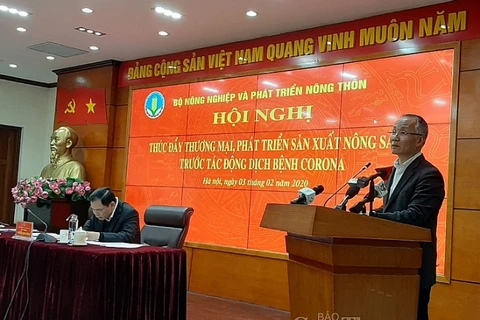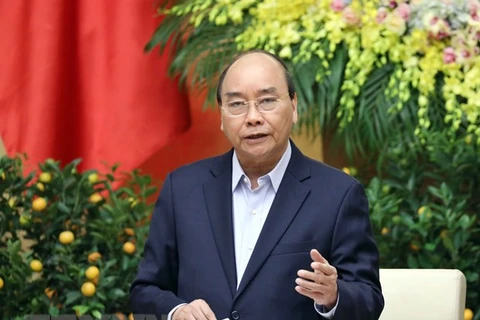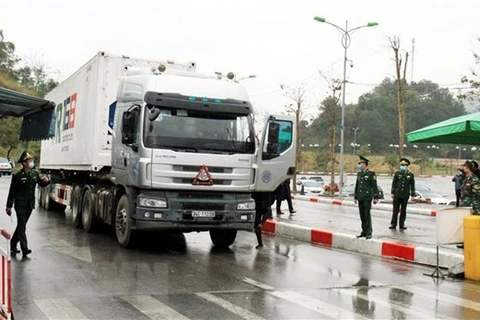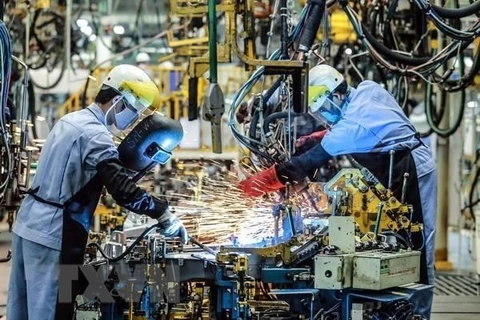 In the context of outbreak of the epidemic in a global scale, Vietnam is doing its best to control the acute respiratory disease caused by the novel coronavirus SARS-CoV-2 (nCoV), focusing on carrying out multi-level isolation for those suspected of infection. Vietnam has so far confirmed 10 infection cases and 304 suspected ones, of whom 214 have tested negative for the virus and 90 are in quarantine while their samples are being tested. In the photo: Hanoi Railway Transport Joint Stock Company disinfected trains on February 7. Spraying disinfectant helps prevent the spread of the novel coronavirus SARS-CoV-2 in the community. (Photo: Viet Hung/Vietnam+)
In the context of outbreak of the epidemic in a global scale, Vietnam is doing its best to control the acute respiratory disease caused by the novel coronavirus SARS-CoV-2 (nCoV), focusing on carrying out multi-level isolation for those suspected of infection. Vietnam has so far confirmed 10 infection cases and 304 suspected ones, of whom 214 have tested negative for the virus and 90 are in quarantine while their samples are being tested. In the photo: Hanoi Railway Transport Joint Stock Company disinfected trains on February 7. Spraying disinfectant helps prevent the spread of the novel coronavirus SARS-CoV-2 in the community. (Photo: Viet Hung/Vietnam+)  To prepare for the worst scenario of the disease outbreak in the community, the Ministry of Health (MoH) has asked 22 central-level hospitals to arrange 3,000 beds for treating patients. Dr. Luong Ngoc Khue, Director of the MoH’s Medical Examination and Treatment Department, also stressed the need for special attention to monitoring the epidemic level and implementing isolation measures. Meanwhile, Deputy Minister of Health Nguyen Thanh Long said at a press conference in Hanoi on February 5 that the coming 7-10 days are not the peak of the epidemic in Vietnam and it is too early to give assessments on the disease development in the country. In the photo: Personnel from the Hanoi Railway Transport Joint Stock Company’s Preventive Health Centre conduct disinfection to prevent the spread of the novel coronavirus in the community. (Photo: Viet Hung/Vietnam+)
To prepare for the worst scenario of the disease outbreak in the community, the Ministry of Health (MoH) has asked 22 central-level hospitals to arrange 3,000 beds for treating patients. Dr. Luong Ngoc Khue, Director of the MoH’s Medical Examination and Treatment Department, also stressed the need for special attention to monitoring the epidemic level and implementing isolation measures. Meanwhile, Deputy Minister of Health Nguyen Thanh Long said at a press conference in Hanoi on February 5 that the coming 7-10 days are not the peak of the epidemic in Vietnam and it is too early to give assessments on the disease development in the country. In the photo: Personnel from the Hanoi Railway Transport Joint Stock Company’s Preventive Health Centre conduct disinfection to prevent the spread of the novel coronavirus in the community. (Photo: Viet Hung/Vietnam+)  Earlier, Prime Minister Nguyen Xuan Phuc on February 3 ordered quarantine of all travellers who come from or transit through the novel coronavirus affected areas in China amid fear of fast spread of the epidemic. Accordingly, those who come from or transit through Hubei shall be immediately kept in isolation at the designated medical establishments of the province/city they enter. The competent authorities shall strictly supervise and seriously disinfect houses and accommodations as well as surrounding areas where suspected patients live. Personnel conducting disinfection wear protective gears meeting standards of the Ministry of Health. In the photo: Spraying disinfectant helps prevent the spread of the novel coronavirus SARS-CoV-2 in the community. (Photo: Viet Hung/Vietnam+)
Earlier, Prime Minister Nguyen Xuan Phuc on February 3 ordered quarantine of all travellers who come from or transit through the novel coronavirus affected areas in China amid fear of fast spread of the epidemic. Accordingly, those who come from or transit through Hubei shall be immediately kept in isolation at the designated medical establishments of the province/city they enter. The competent authorities shall strictly supervise and seriously disinfect houses and accommodations as well as surrounding areas where suspected patients live. Personnel conducting disinfection wear protective gears meeting standards of the Ministry of Health. In the photo: Spraying disinfectant helps prevent the spread of the novel coronavirus SARS-CoV-2 in the community. (Photo: Viet Hung/Vietnam+)  Last week, the Government chief issued directives clarifying responsibilities of ministries, agencies and localities in prevention and control of the epidemic. Following the issuance of the directive, the Ministry of Public Security asked immigration forces to suspend entry visa issuance to tourists from the novel coronavirus affected areas. This is part of the ministry’s measures to strengthen prevention and control of the disease thought to have originated from Wuhan, China. In the photo: Personnel spray trains with disinfectant to prevent the spread of the novel coronavirus (nCoV). Personnel conducting disinfection wear protective gears which meets standards of the Ministry of Health. (Photo: Viet Hung/Vietnam+)
Last week, the Government chief issued directives clarifying responsibilities of ministries, agencies and localities in prevention and control of the epidemic. Following the issuance of the directive, the Ministry of Public Security asked immigration forces to suspend entry visa issuance to tourists from the novel coronavirus affected areas. This is part of the ministry’s measures to strengthen prevention and control of the disease thought to have originated from Wuhan, China. In the photo: Personnel spray trains with disinfectant to prevent the spread of the novel coronavirus (nCoV). Personnel conducting disinfection wear protective gears which meets standards of the Ministry of Health. (Photo: Viet Hung/Vietnam+)  The Ministry of Public Security tasked local-level police to coordinate with relevant ministries and agencies in tightening strict control at land, air and sea ports and encourage citizens not to travel across border crossings to prevent the virus infections. Local police forces shall be active in detecting, preventing and punishing those who try to disseminate false information on the epidemic. New infection cases must be immediately made public, the Government chief ordered. In the photo: Railway workers wear masks to avoid the risk of virus infection. Spraying disinfectant helps prevent the spread of the novel coronavirus SARS-CoV-2 (nCoV) in the community. (Photo: Viet Hung/Vietnam+)
The Ministry of Public Security tasked local-level police to coordinate with relevant ministries and agencies in tightening strict control at land, air and sea ports and encourage citizens not to travel across border crossings to prevent the virus infections. Local police forces shall be active in detecting, preventing and punishing those who try to disseminate false information on the epidemic. New infection cases must be immediately made public, the Government chief ordered. In the photo: Railway workers wear masks to avoid the risk of virus infection. Spraying disinfectant helps prevent the spread of the novel coronavirus SARS-CoV-2 (nCoV) in the community. (Photo: Viet Hung/Vietnam+)  Meanwhile, the Civil Aviation Administration of Viet Nam (CAV) has asked airlines to proactively adjust their flight schedules and suspended all flights from coronavirus-affected areas to the Southeast Asian country. In its recent directive on the prevention and combat of the epidemic, the CAV ordered airlines to not conduct regular flights and require additional licenses for flights from Viet Nam to China’s affected regions. Flights from and to affected areas in China must be restricted, the CAV said. In the photo: The Hanoi Railway Transport Joint Stock Company disinfects trains to prevent the spread of the novel coronavirus SARS-CoV-2 in the community, February 7, 2020. (Photo: Viet Hung/Vietnam+)
Meanwhile, the Civil Aviation Administration of Viet Nam (CAV) has asked airlines to proactively adjust their flight schedules and suspended all flights from coronavirus-affected areas to the Southeast Asian country. In its recent directive on the prevention and combat of the epidemic, the CAV ordered airlines to not conduct regular flights and require additional licenses for flights from Viet Nam to China’s affected regions. Flights from and to affected areas in China must be restricted, the CAV said. In the photo: The Hanoi Railway Transport Joint Stock Company disinfects trains to prevent the spread of the novel coronavirus SARS-CoV-2 in the community, February 7, 2020. (Photo: Viet Hung/Vietnam+)  The CAV requested airports to step up inspection and coordinate with relevant agencies to carry out plans to prevent and cope with a possible virus outbreak. It asked the air transport department to suspend the approval of new flights from Viet Nam to China’s affected areas and vice versa. In its previous directive, the CAV ordered airlines to immediately report suspected cases to service supply agencies for prompt isolation and prevention. In the photo: Hanoi Railway Transport Joint Stock Company disinfects trains to prevent the spread of the novel coronavirus SARS-CoV-2 in the community. Passenger seats on trains are also disinfected. (Photo: Viet Hung/Vietnam+)
The CAV requested airports to step up inspection and coordinate with relevant agencies to carry out plans to prevent and cope with a possible virus outbreak. It asked the air transport department to suspend the approval of new flights from Viet Nam to China’s affected areas and vice versa. In its previous directive, the CAV ordered airlines to immediately report suspected cases to service supply agencies for prompt isolation and prevention. In the photo: Hanoi Railway Transport Joint Stock Company disinfects trains to prevent the spread of the novel coronavirus SARS-CoV-2 in the community. Passenger seats on trains are also disinfected. (Photo: Viet Hung/Vietnam+)  The outbreak of the acute respiratory disease caused by the novel coronavirus SARS-CoV-2 (nCoV) first occurred in Wuhan, China, in late December 2019, and has now spread to 15 other countries with about 60 cases in Asia, Europe, North America and the Middle East. In the photo: Spraying disinfectant helps prevent the spread of the novel coronavirus SARS-CoV-2 in the community. Passenger seats on trains are also disinfected. The Hanoi Railway Transport Joint Stock Company disinfected trains to prevent the spread of the novel coronavirus on February 7. Disinfectant works within seven days. Spraying disinfectant helps prevent the spread of the novel coronavirus SARS-CoV-2 in the community. (Photo: Viet Hung/Vietnam+)
The outbreak of the acute respiratory disease caused by the novel coronavirus SARS-CoV-2 (nCoV) first occurred in Wuhan, China, in late December 2019, and has now spread to 15 other countries with about 60 cases in Asia, Europe, North America and the Middle East. In the photo: Spraying disinfectant helps prevent the spread of the novel coronavirus SARS-CoV-2 in the community. Passenger seats on trains are also disinfected. The Hanoi Railway Transport Joint Stock Company disinfected trains to prevent the spread of the novel coronavirus on February 7. Disinfectant works within seven days. Spraying disinfectant helps prevent the spread of the novel coronavirus SARS-CoV-2 in the community. (Photo: Viet Hung/Vietnam+)  Spraying disinfectant helps prevent the spread of the novel coronavirus SARS-CoV-2 in the community. In the photo: Hanoi Railway Transport Joint Stock Company disinfects trains to prevent the spread of the novel coronavirus SARS-CoV-2 in the community. Personnel spray trains with disinfectant to prevent the spread of the novel coronavirus (nCoV). Personnel conducting disinfection wear protective gears which meets standards of the Ministry of Health. As of February 6, Vietnam has confirmed 12 coronavirus cases. The most recent cases were reported in the northern province of Vinh Phuc. Vietnam is doing its best to control the acute respiratory disease caused by the novel coronavirus SARS-CoV-2 (nCoV), focusing on carrying out multi-level isolation for those suspected of infection. (Photo: Viet Hung/Vietnam+)
Spraying disinfectant helps prevent the spread of the novel coronavirus SARS-CoV-2 in the community. In the photo: Hanoi Railway Transport Joint Stock Company disinfects trains to prevent the spread of the novel coronavirus SARS-CoV-2 in the community. Personnel spray trains with disinfectant to prevent the spread of the novel coronavirus (nCoV). Personnel conducting disinfection wear protective gears which meets standards of the Ministry of Health. As of February 6, Vietnam has confirmed 12 coronavirus cases. The most recent cases were reported in the northern province of Vinh Phuc. Vietnam is doing its best to control the acute respiratory disease caused by the novel coronavirus SARS-CoV-2 (nCoV), focusing on carrying out multi-level isolation for those suspected of infection. (Photo: Viet Hung/Vietnam+)  As of February 6, Vietnam has confirmed 12 coronavirus cases. The most recent cases were reported in the northern province of Vinh Phuc. In the context of outbreak of the epidemic in a global scale, Vietnam is doing its best to control the acute respiratory disease caused by the novel coronavirus SARS-CoV-2 (nCoV), focusing on carrying out multi-level isolation for those suspected of infection. In the photo: The Hanoi Railway Transport Joint Stock Company disinfects trains to prevent the spread of the novel coronavirus SARS-CoV-2 in the community, February 7, 2020. Spraying disinfectant helps prevent the spread of the novel coronavirus SARS-CoV-2 in the community. (Photo: Viet Hung/Vietnam+)
As of February 6, Vietnam has confirmed 12 coronavirus cases. The most recent cases were reported in the northern province of Vinh Phuc. In the context of outbreak of the epidemic in a global scale, Vietnam is doing its best to control the acute respiratory disease caused by the novel coronavirus SARS-CoV-2 (nCoV), focusing on carrying out multi-level isolation for those suspected of infection. In the photo: The Hanoi Railway Transport Joint Stock Company disinfects trains to prevent the spread of the novel coronavirus SARS-CoV-2 in the community, February 7, 2020. Spraying disinfectant helps prevent the spread of the novel coronavirus SARS-CoV-2 in the community. (Photo: Viet Hung/Vietnam+) VNA
























